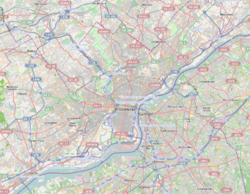Philadelphia Naval Shipyard
| The Navy Yard, Philadelphia, PA | |
|---|---|
| Philadelphia, Pennsylvania | |

Reserve Fleet in Philadelphia in 1955
|
|
| Type | Shipyard |
| Site information | |
| Controlled by | United States Navy |
| Site history | |
| Built | 1917 (League Island Facility) |
| In use | 1801–1995 |
| Battles/wars | |
|
Philadelphia Naval Shipyard Historic District
|
|
| Location | S. Broad St. Philadelphia, Pennsylvania |
| Coordinates | 39°53′28″N 75°10′43″W / 39.89111°N 75.17861°WCoordinates: 39°53′28″N 75°10′43″W / 39.89111°N 75.17861°W |
| Area | 1,200 acres (490 ha) |
| Built | 1876 |
| Architect | Robert E. Peary; Karcher & Smith |
| Architectural style | Modern Movement, Late Victorian |
| NRHP Reference # | 99001579 |
| Added to NRHP | December 22, 1999 |
|
Commandant's Quarters
|
|
 |
|
| Location | Philadelphia, Pennsylvania |
| Built | 1874 |
| Architect | US Department of the Navy |
| Architectural style | Italian Villa |
| NRHP Reference # | 76001661 |
| Added to NRHP | 03 June 1976 |
The Navy Yard, formerly known as the Philadelphia Naval Shipyard and Philadelphia Naval Business Center, was an important naval shipyard of the United States for almost two centuries. It is now a large industrial park that includes a commercial shipyard, Aker Philadelphia Shipyard.
Philadelphia's original navy yard, begun in 1776 on Front Street and Federal Street in what is now the Pennsport section of the city, was the first naval shipyard of the United States. The new, much larger yard grew up around facilities begun in 1871 on League Island at the confluence of the Delaware and Schuylkill Rivers.
The United States Navy ended most of its activities there in the 1990s, and in 2000, the city of Philadelphia took over and began to redevelop the land. The Navy still has a Naval Inactive Ship Maintenance Facility and a few engineering activities at the site.
The yard has its origins in a shipyard on Philadelphia's Front Street on the Delaware River that was founded in 1776 and became an official United States Navy site in 1801. From 1812 till 1865 it was a big production center. The first ship which was launched to the water was vessel Franklin. This event watched more than 50000 Philadelphians. The rapid development of other shipbuilding companies pledged Philadelphia to improve production processes. It was the first shipyard in the world which used floating dry docks in the building process to improve an operating time of the ships. After the advent of ironclad warships made the site obsolete, new facilities were built in 1871 on League Island at the confluence of the Delaware and Schuylkill Rivers.
...
Wikipedia



